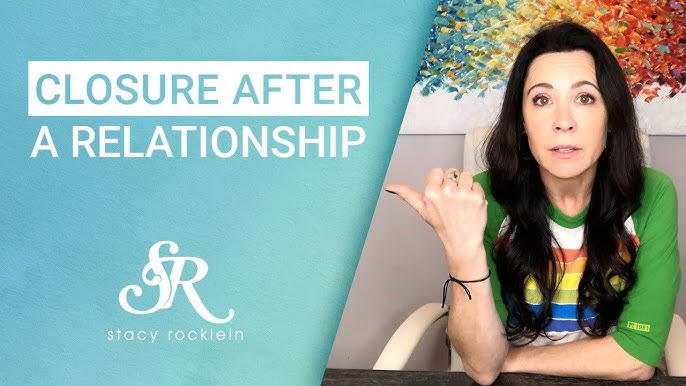
Understanding Closure After a Relationship Ends
Definition of Closure
Closure is often described as the emotional and psychological process of coming to terms with the end of a relationship. It is the sense of resolution that allows individuals to accept what occurred, learn from the experience, and move forward.
Why Closure Is Important
Achieving closure is crucial for several reasons:
- Emotional Healing: It helps in processing feelings, reducing lingering pain.
- Understanding: Provides clarity about what went wrong, fostering growth.
- Moving On: Facilitates the transition into new chapters of life with confidence.
Reflecting on one’s experience can lead to profound insights and ultimately a healthier approach to future relationships.

Effects of Lack of Closure
Emotional Impact
When closure remains elusive, individuals may experience a whirlwind of emotions. Lingering feelings such as:
- Anger: Resentment towards the ex-partner or oneself for decisions made.
- Sadness: A persistent feeling of loss that hinders moving on.
- Confusion: Difficulty understanding the reasons behind the breakup can lead to anxiety.
These emotions often take a toll on mental health, making it challenging to feel at peace.
Moving Forward Difficulties
The absence of closure creates barriers in moving forward. Individuals may find themselves stuck in a cycle of:
- Rumination: Constantly replaying past interactions and events.
- Avoidance: Hesitance to enter new relationships out of fear of repeating mistakes.
- Uncertainty: Difficulty trusting oneself or others, impacting future connections.
For many, this struggle feels like being stuck in a quicksand of unresolved feelings, preventing growth and healing.

Benefits of Achieving Closure
Healing Process
Achieving closure marks a pivotal step in the healing process. It allows individuals to confront their emotions and:
- Release Pain: Letting go of lingering sadness feels liberating.
- Understand Grief: Accepting the loss fosters emotional resilience.
- Rebuild Trust: Regaining faith in oneself and in others brings solace.
For instance, after resolving feelings from a breakup, one can feel an incredible weight lifted, ready to embrace life anew.
Personal Growth Opportunities
Closure opens doors to personal growth and self-discovery. By examining past relationships, individuals can:
- Identify Patterns: Recognizing recurring behaviors promotes better choices.
- Boost Self-Awareness: Understanding one’s needs leads to healthier connections.
- Enhance Resilience: Overcoming challenges strengthens emotional fortitude.
Embracing these lessons can transform past pain into a powerful catalyst for future happiness.

Ways to Find Closure
Acceptance and Acknowledgment
Finding closure begins with acceptance and acknowledgment of the relationship’s end. This step involves:
- Facing Reality: Confronting the facts without sugarcoating them.
- Validating Emotions: Recognizing that it’s okay to feel hurt or angry.
- Letting Go: Making a conscious decision to release attachment to the past.
For example, writing a letter to oneself about the end can be a powerful way to process feelings.
Self-Reflection and Forgiveness
Engaging in self-reflection allows individuals to deeply analyze their experiences. This process can include:
- Journaling: Documenting thoughts and feelings to gain clarity.
- Forgiving Oneself: Letting go of guilt or regret encourages healing.
- Understanding Lessons: Identifying what worked and what didn’t fosters growth.
Through these practices, individuals can transform pain into insights, paving the way for a brighter future.

Seeking Support for Closure
Therapy and Counseling
One of the most effective ways to find closure is through professional therapy and counseling. Trained therapists can help:
- Process Emotions: Guiding individuals to articulate their feelings safely.
- Provide Tools: Offering coping strategies to manage anxiety and sadness.
- Facilitate Discovery: Helping to uncover underlying patterns that may recur in relationships.
For many, these sessions become a sanctuary for healing and personal insight.
Engaging with Supportive Relationships
In addition to therapy, leaning on supportive relationships can be incredibly beneficial. Connecting with friends and family can:
- Create a Safe Space: Provide an environment to share experiences without judgment.
- Encourage Healing: Friends can offer comforting perspectives and reassurance.
- Facilitate Fun and Joy: Engaging in activities together can lift spirits.
Sharing the journey with trusted individuals can foster connection and aid in the pursuit of closure.

Closure Rituals and Practices
Journaling and Reflection
Engaging in journaling and reflection can be a powerful ritual for finding closure. This practice allows individuals to:
- Articulate Feelings: Writing down emotions can clarify complex thoughts.
- Track Progress: Over time, journal entries help visualize growth and healing.
- Identify Patterns: Recognizing recurring themes enhances self-awareness.
Many find comfort in reading past entries, serving as reminders of resilience and transformation.
Letting Go Ceremony
A letting go ceremony offers a symbolic way to release lingering attachments. This can involve:
- Creating a Ritual: Lighting candles, writing goodbye letters, or even a small gathering with close friends.
- Physical Actions: Burying reminders or tossing them into a river can make the release tangible.
- Expressing Gratitude: Acknowledging the lessons learned can provide closure.
Engaging in these practices reinforces a sense of empowerment while transforming previous pain into hope and renewal.

Moving Forward After Closure
Setting Boundaries
Once closure has been achieved, setting boundaries becomes essential for protecting mental well-being. This involves:
- Defining Limits: Understanding what behaviors are acceptable in future relationships.
- Communicating Needs: Clearly expressing what is required for comfort and security.
- Enforcing Boundaries: Being consistent in upholding those limits to foster healthy dynamics.
For instance, after a breakup, someone might decide to limit contact with the ex to allow healing.
Embracing Self-Love
Embracing self-love is a vital aspect of moving forward. This journey can include:
- Prioritizing Self-Care: Engaging in activities that bring joy and relaxation.
- Positive Affirmations: Reminding oneself of inherent worth and beauty.
- Setting Personal Goals: Focusing on aspirations builds confidence and motivation.
Experiencing self-love cultivates resilience, ensuring a healthier approach in future relationships and life endeavors.

Closure for Personal Well-Being
Mental Health Benefits
Achieving closure greatly enhances mental health, paving the way for emotional stability. Some key benefits include:
- Reduced Anxiety: Letting go of unresolved feelings alleviates stress.
- Enhanced Mood: Embracing closure often leads to increased happiness and optimism.
- Improved Focus: With emotional baggage eased, individuals can concentrate on personal goals.
Many find that they sleep better and experience fewer mood swings once closure is attained.
Building Healthy Relationships
Closure also lays the foundation for building healthy future relationships. This involves:
- Clear Communication: Knowing one’s needs fosters open dialogue with new partners.
- Trust Development: Healing from past experiences helps restore faith in others.
- Setting Expectations: Understanding boundaries leads to healthier dynamics.
By addressing past issues, individuals cultivate richer connections, allowing for more meaningful and fulfilling relationships moving forward.
